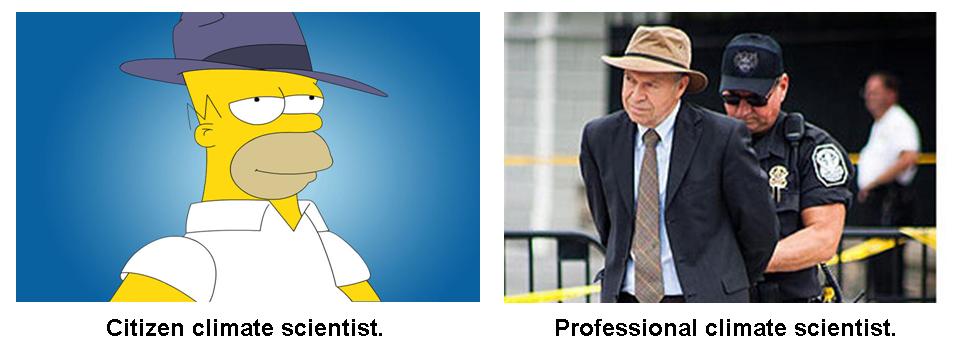
I’ve been asked to comment on Willis Eschenbach’s recent analysis of CERES radiative budget data (e.g., here). Willis likes to analyze data, which I applaud. But sometimes Willis gives the impression that his analysis of the data (or his climate regulation theory) is original, which is far from the case.
Hundreds of researchers have devoted their careers to understanding the climate system, including analyzing data from the ERBE and CERES satellite missions that measure the Earth’s radiative energy budget. Those data have been sliced and diced every which way, including being compared to surface temperatures (as Willis recently did).
I’m not defending the IPCC’s use of climate models here. I’m talking about climate diagnostic work with real satellite data…figuring out how the climate system works from observations.
I’ve previously commented on Willis’ thermostat hypothesis of climate system regulation, which Willis never mentioned was originally put forth by Ramanathan and Collins in a 1991 Nature article. Basically, it has been known for a long time that moist convection has a huge cooling effect on the surface of the Earth (e.g. Manabe and Strickler, 1964), but the fact that deep moist convection tends to occur over the warmest tropical waters doesn’t really tell us anything about the sensitivity of the climate system or cloud feedbacks.
Take Willis’ latest posts about the “cloud radiative effect”, which formerly had been called “cloud radiative forcing”. All you have to do is google “cloud radiative forcing” (choose image results if you want lots of pretty pictures) to see that many scientist-years have been devoted to analyzing such data.
If you want to get some idea of what has been done on cloud feedback, then a good place to start is Graeme Stephens (2005) review of cloud feedback work performed over the years.
The reason I am picking on Willis a little bit here is that his posts sometimes lead to comments like this:
“Geez – if I was one of the hoard of IPCC enthusiastic fools, this would be downright embarrassing. I sure wouldn’t want my mom to know I was so ineffective that some guy named Willis sits in his den and does more and better work than my entire IPCC crowd of hundreds of scientists, economists, psychologists, train engineers, tree surgeons, etc does in 4-5 years.”
C’mon, folks! Do you really think that of the billions of dollars spent on designing, launching, and keeping these satellite instruments going, that no one thought to analyze the data? Really? That’s why hundreds of scientists and engineers collaborated on such projects in the first place!
Just because you can’t find some technical issue described in blogs doesn’t mean it hasn’t been addressed. It’s in the scientific literature, and in workshop reports, conference proceedings, etc.
In retrospect, it’s now clear that public interest in climate change has led to citizen-scientists like Willis taking matters into his/her own hands, since so little information is available in a form that is easily digested by the public. Career scientists like myself have not done enough public outreach to describe what they have done. And when we do such outreach, it is usually too technical to understand. We are too busy publishing-or-perishing.
As a result, just about every time someone posts an amateur analysis of data that becomes popular, I’m asked to read it, critique it, and respond. Well, I simply don’t have the time. But these things sometimes get legs, and when they do, I get even more e-mails.
For example, I still get the occasional e-mail because the Sky Dragon Slayers took a NASA report about CO2 cooling of the upper atmosphere (which we have known for at least 50 years) and spun it into ‘proof’ that CO2 can’t warm the lower atmosphere. Well, greenhouse gases cool the upper layers, and warm the lower layers, of planetary atmospheres. Nothing new there…except maybe to misguided public perceptions of the science, which usually only involve the warming effects of greenhouse gases.
Anyway, I applaud Willis, who is a sharp guy, for trying. But now I am asking him (and others): read up on what has been done first, then add to it. Or, show why what was done previously came to the wrong conclusion, or analyzed the data wrong.
But don’t assume you have anything new unless you first do some searching of the literature on the subject. True, some of the literature is paywalled. Sorry, I didn’t make the rules. And I agree, if research was public-funded, it should also be made publicly available.
But cloud feedback is a hard enough subject without muddying the waters further. Yes, clouds cool the climate system on average (they raise the planetary albedo, so they reduce solar input into the climate system). But how clouds will change due to warming (cloud feedback) could be another matter entirely. Don’t conflate the two.
For instance, let’s say “global warming” occurs, which should then increase surface evaporation, leading to more convective overturning of the atmosphere and precipitation. But if you increase clouds in one area with more upward motion and precipitation, you tend to decrease clouds elsewhere with sinking motion. It’s called mass continuity…you can’t have rising air in one region without sinking air elsewhere to complete the circulation. “Nature abhors a vacuum”.
So, examining how clouds and temperatures vary together locally (as Willis has done) really doesn’t tell you anything about feedbacks. Feedbacks only make sense over entire atmospheric circulation systems, which are ill-defined (except in the global average).
And we already knew that clouds, on average, cool the climate system, as described almost 25 years ago from the first Earth Radiation Budget Experiment (ERBE) data.

 Home/Blog
Home/Blog



